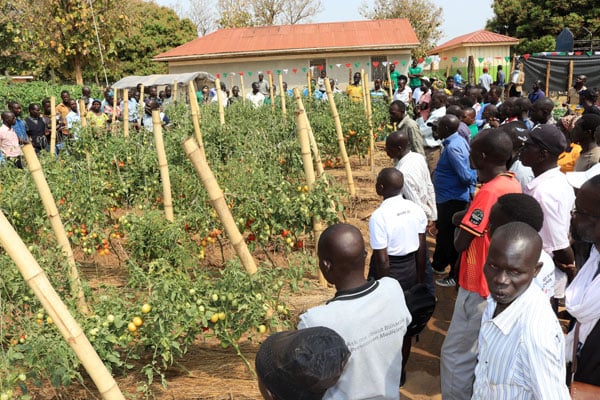Prime
Refugees empowered with sustainable farming skills as food rations reduce in West Nile

Some of the beneficiaries during training
What you need to know:
- The East African nation continues to strategize on how to create sustainable interventions to overcome the humanitarian crisis that often results from massive influx from neighbouring countries like DR Congo, South Sudan, among others.
Uganda is globally recognised as host to some of the world’s largest refugee populations, nearing 1. 4 million.
The East African nation continues to strategize on how to create sustainable interventions to overcome the humanitarian crisis that often results from massive influx from neighbouring countries like DR Congo, South Sudan, among others.
For instance, Rhino refugee settlement in West Nile, North Western Uganda hosts over 125,000 refugees from South Sudan --majority of whom women and children--often displaced by hunger and extreme poverty.
Notable amidst existing interventions is East Seed’s sustained effort to promote repeatable and value-added food security approaches, namely vegetable farming techniques for better yields.

Steered by Stichting East-West Seed Knowledge Transfer, a non-corporate foundation committed to generating sustainable yields and incomes among small-holder farmers, the effort has also often been endorsed by the office of the Prime Minister in Uganda (OPM), among other stakeholders.
The project, launched in the Rhino refugee settlement in Arua, targets the 125,000 refugees first but is expected to provide a model for other settlements in Uganda, according to officials.
Speaking at the launch of farmer field day at Omugo Sub County recently, Terego District chairman, Wildfred Seka lauded East-West Seed, arguing that their projects identify with the livelihood of ordinary persons.
“Imagine my district is in a hot season now, as you already know, but farmers are still selling watermelon at Shs10,000 each, which means, if a farmer sells 100 of them, poverty will soon be history. The palms given today for example, are going to help increase production. Our farmers now only need to bulk produce in groups and sell to a ready market. Which proceeds can be used to pay school fees. Even the international demand for fruits is huge. I was in Germany recently, where I met farmers who need fruits from Uganda, thank you East-West Seed,” he said.
The project targets 7,000 Households and is executed with support from the Arab Gulf Programme for Development (AGFUND) with the goal of diversifying nutrition, among refugee settlements.

The foundation’s country manager, Mr Joshua Mwanguhya, highlighted the importance of the intervention ad said: “Water scarcity is an issue in vegetable production. That’s why we are pushing for home gardens, and now that WFP is moving away from food distribution to giving cash in these settlements, it is becoming more critical that we have water, so that youth and women can grow throughout the year. We are currently working with 5,000 refugees, yet the region has over 120,000 refugees, so you can imagine the support we need to empower women as they sustain their families.”
On the sustainable effect of the programme, Mr Mwanguhya added that when refugees eventually return to their home countries, they will have farming knowledge to sustain themselves.
“I have been to South Sudan, and in their local markets, 80-90 percent of vegetables are imported from Uganda, this is an opportunity for them to gain a decent living now that they’ve got the farming skills they need,” he said.
Many women beneficiaries also lauded the project, especially for the diversified kitchen vegetable garden that helps mothers maintain a balanced diet.
“Because of kitchen garden, our children can no longer get malnourished, we are earning money by selling to communities too. The quality seeds we got are changing our little gardens and are in turn thriving our nutrition,” Ms Christine Drusila from Omugo Sub County noted.
West Nile region and Northern Uganda in general suffer extended dry seasons during the year, a reality that creates water scarcity, and in turn hinders farm productivity. Resilient vegetable farming, for example, is one of the activities that has tried to address the challenge.
Other notable responses, especially among women impacted, spoke of improved livelihoods arising out of vegetable sales in the settlements, as women beneficiaries earn and live economically decent lives.
According to Mr Mwanguhya, the foundation’s interventions are in commitment to sustainable development goal number two, which works towards providing food and humanitarian relief, thus establishing sustainable food production. The project also aims to train 10,000 farmers in peer-to-peer learning through radio and digital.




